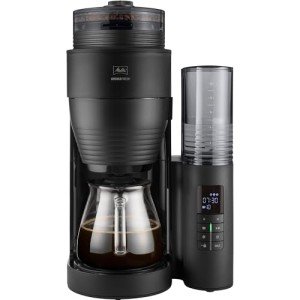The Rise and Reign of Coffee Brewers: A Comprehensive Guide to Brewing Perfection
Coffee is more than simply a beverage; it's a ritual that many all over the world value. Whether it's the very first cup to start the day or a mid-afternoon pick-me-up, the approach of preparation greatly influences the flavor and total experience of coffee. Coffee brewers have progressed significantly for many years, from standard drip machines to sophisticated espresso makers, making it vital for coffee enthusiasts to understand the various types available and their unique advantages.
The Evolution of Coffee Brewing Methods
Coffee brewing has an abundant history that spans centuries. The technique utilized typically reflects cultural customs and improvements in technology. Here, pop over to this website will explore some of the most popular coffee developing techniques, their benefits and drawbacks, and which type of maker might suit various way of lives and preferences.
1. Drip Coffee Makers
The drip coffee machine is one of the most popular developing approaches, specifically in families and offices.
Pros:
- Simple to utilize: Just add water and coffee grounds.
- Perfect for developing multiple cups at the same time.
- Constant flavor with automatic temperature level control.
Cons:
- Limited control over brewing time and temperature.
- Generally needs filtered coffee, which some may find restricting.
2. French Press
The French press, also called a press pot or plunger pot, is preferred by numerous for its abundant flavor extraction.
Pros:
- Allows for complete control over brewing time.
- Produces a thick and flavorful cup of coffee.
- No requirement for paper filters, which is environmentally friendly.
Cons:
- Requires more manual effort than automatic machines.
- Can lead to sediment in the bottom of the cup.
3. Espresso Machines
Espresso machines vary from manual to completely automated systems designed to produce concentrated coffee shots.
Pros:
- Versatile: Can make espresso, cappuccinos, lattes, and more.
- Produces rich, strong tastes and a silky crema.
Cons:
- Typically more expensive and requires more knowledge to run.
- Cleaning up and maintenance can be more complex.
4. Pour-Over Coffee Makers
Pour-over techniques like the Chemex and Hario V60 have actually gotten traction for their ability to brew a clean and fragrant cup.
Pros:
- Provides outstanding control over the developing procedure.
- High-quality flavor extraction when done properly.
Cons:
- Time-consuming and needs ability to best.
- Not perfect for producing large amounts.
5. Cold Brew Coffee Makers
Cold brew is made by soaking coarsely ground coffee in cold water, producing a smooth, less acidic beverage.
Pros:
- Smooth and rejuvenating, with lower acidity compared to hot brew.
- Can be made in large batches and saved for days.
Cons:
- Requires innovative planning, as steeping can take 12 to 24 hours.
- Some might not appreciate the unique flavor profile.
| Developing Method | Pros | Cons |
|---|---|---|
| Drip Coffee Maker | Simple, brews several cups | Minimal control |
| French Press | Full control, rich taste | Manual effort required |
| Espresso Machine | Versatile, abundant tastes | Greater cost and complexity |
| Pour-Over | Excellent control, high-quality flavor | Lengthy, skill-dependent |
| Cold Brew | Smooth, low acidity | Long developing time, unique flavor profile |
Choosing the Right Coffee Brewer
When choosing a coffee brewer, numerous elements should be thought about:
- Brew Size: How lots of cups do you generally make simultaneously? For those developing for a crowd, a drip coffee maker or a larger French press may be appropriate.
- Time Commitment: How much time are you prepared to devote to brewing? If time is of the essence, automatic machines may be more suitable.
- Taste Preferences: Do you enjoy complicated flavors and boldness? An espresso machine or pour-over technique may be perfect.
- Spending plan: High-quality coffee machines can vary significantly in price, so determining your budget plan will narrow down choices.
- Space: Consider the countertop space offered in your kitchen area, as some brewers can be rather large.
Frequently Asked Questions About Coffee Brewers
1. How do I clean my coffee maker?
The majority of coffee makers have specific cleansing directions in their manuals, but basic techniques include:
- For drip coffee machine: Run a solution of vinegar and water through the brew cycle followed by clean water.
- For French presses: Disassemble the plunger and clean it under hot water using a soft sponge.
2. How frequently should I change my coffee maker?
Usually, coffee makers can last anywhere from 5 to 10 years with appropriate care. If you discover a decrease in the taste of your coffee or persistent problems with performance, it may be time for a replacement.
3. Can I use routine coffee with an espresso machine?
Yes, you can utilize regular coffee, however it will not yield the same concentrated flavor profile as using espresso roast coffee particularly designed for such machines.
4. What is the very best coffee-to-water ratio for brewing?
A basic standard is the "Golden Ratio" of 1:16, which is one part coffee to 16 parts water, however experimentation may lead you to your personal choice.
5. Are expensive coffee makers worth it?
Higher-end coffee makers often have much better develop quality, more functions, and supply better flavor control. Nevertheless, "worth it" can be subjective based on private requirements and budget.
The variety of coffee brewers readily available today permits enthusiasts to explore and explore flavors, methods, and brewing times, making every cup a distinct experience. Whether choosing for a simple drip machine or mastering the art of espresso brewing, the journey of creating the perfect cup of coffee continues to develop. By understanding the different developing approaches and their attributes, people can make educated choices that boost their day-to-day coffee ritual and gratitude. After all, the ideal maker can make all the difference in enjoying that much-loved cup of joe.

